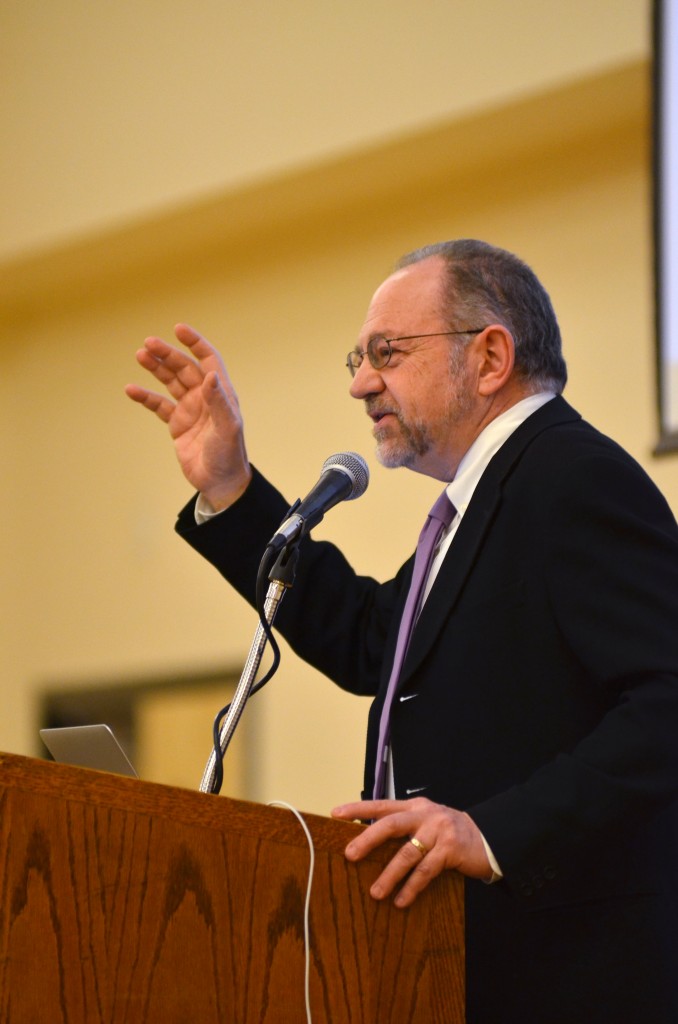
As a part of the theme of ethics for Research Days, Jonathan Moreno explored the military application of neuroscience and modern technology while examining their morality and legality.
Moreno, a professor of medical ethics and health policy, history and sociology of science and philosophy at the University of Pennsylvania and senior fellow at the Center of American Progress in Washington, D.C., was the keynote speaker for Binghamton University’s third annual Research Days. He spoke Wednesday evening to a packed Mandela Room.
Moreno’s speech, titled “Mind Wars: Brain Science and the Military in the 21st Century,” after his book of the same name, charted the history of military interest in neuroscience and the brain itself.
“This is the era in which big governments are spending lots of money trying to understand how the brain works,” Moreno said.
According to Moreno, the U.S. Army, Navy, Air Force and Defense Advanced Research Projects Agency (DARPA) spent a combined $353 million on cognitive neuroscience funding in 2011. While this is not a large part of their respective budgets, Moreno said it demonstrates an interest in potential future applications.
A large part of his speech focused on the use of drugs in combat settings. Moreno said that during the 1950s, Americans were concerned that American prisoners of war were being subjected to drugs, such as LSD, which manipulated them into false confessions of treason.
“A journalist actually coined the term ‘brainwashing…’” Moreno said. “No one was exactly sure what that word meant, but it sounded really good.”
According to one declassified document from 1953, the U.S. government spent $39,500 on LSD, LSD antagonists and related substances for testing, providing substances to soldiers and gauging the effects.
From the 1960s to 1980s, interest moved toward psychoactive weapons within the Soviet Union, which led U.S. investigations into the matter. In a National Research Council Report from 1988, titled “Enhancing Human Performance: Issues, Theories and Techniques,” researchers were looking into the possibility of an “anti-missile time warp” meant to deflect nuclear warheads, sending them back in time.
“OK, time-out. I read a lot of science fiction, and I know that if you go back in time and step on a butterfly and you come back, then everything will be different,” Moreno said. “Now obviously these people weren’t reading those stories, otherwise they wouldn’t have wasted their time with this.”
While past ventures into the military applications of experimental drugs and mind warfare come off as laughable, Moreno said modern technologies are much more realistic. Moreno cited drugs such as oxytocin, a natural hormone that causes users to become more trusting, and beta blockers, which block hormones that associate emotions with memories.
Both drugs have potential military applications, in terms of interrogations and post-traumatic stress disorder prevention respectively. While Moreno said the use of oxytocin would be illegal under the Chemical Weapons Convention, he admitted it was more effective than torture.
“It would be a hell of a lot more efficient to give somebody a drug — a naturally occurring drug — just to stimulate them than waterboarding someone 160 times the way it was done in Guantanamo,” Moreno said. “Very inefficient.”
Moreno discussed testing on rats, where scientists were able to control the rodent’s movement using an implant in the brain. While the current testing is limited, Moreno questioned how far the research could go, to the point of remote-controlled soldiers.
Moreno closed with a video of the Samsung SGR-A1, a military sentry robot being used in the Korean demilitarized zone capable of tracking human targets. The sentry requires a human to determine whether or not to fire, but Moreno said it was a small step to fully automatize the robot.
“Now what if you could take the human being out of the loop in an offensive system?” Moreno asked.
Moreno’s speech was followed by a question-and-answer segment from the audience.
Donald Loewen, vice provost for undergraduate education, said he wanted students to understand the real-world implications of their research during Moreno’s talk.
“[Bioethics is] a topic that is going to grow in importance and in complexity, and it’s going to really confront the current generation of students in major ways,” Loewen wrote in an email. “The more that we develop critical thinking skills and develop the habit of addressing difficult issues from a variety of perspectives, the more we’ll be able to deal with them productively.”
Provost Donald Nieman introduced Moreno, saying that his work demonstrates the importance of taking an interdisciplinary approach to certain subjects.
“It was a fascinating talk addressing scientific and ethical issues in a historical context,” Nieman said.
Melissa Larson, a senior majoring in biology, said she agreed with Moreno’s ethical concerns.
“Modern advances in computers, pharmaceuticals and weaponry all pose as a potential threat in a mass conflict situation,” Larson said.


